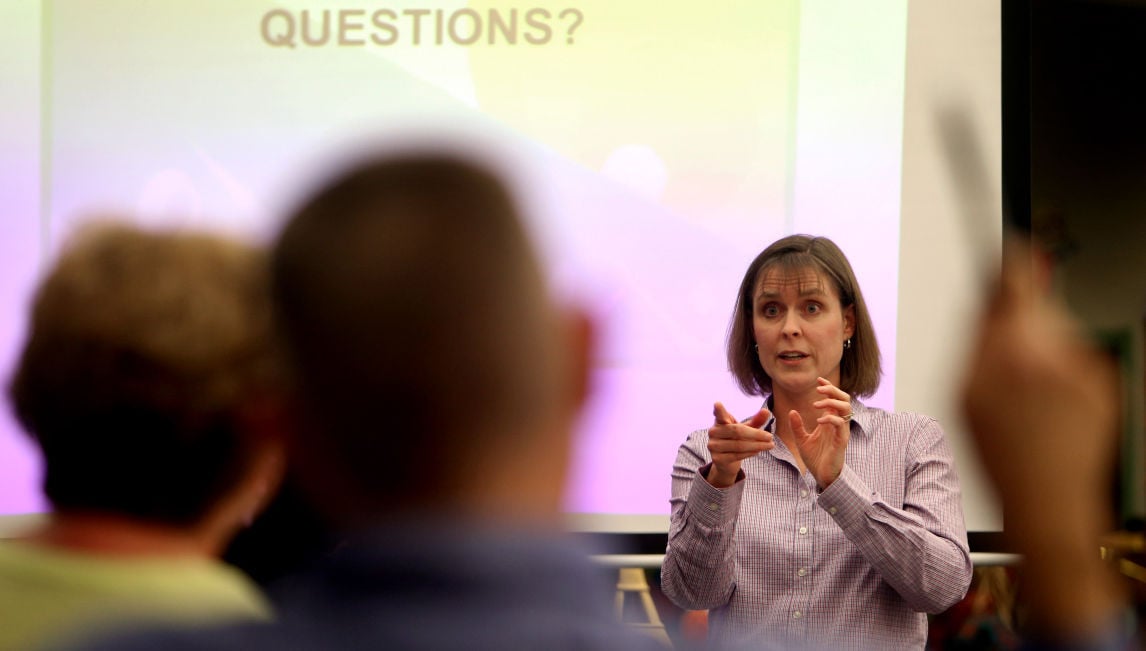Heather Morzinski leafed through a pile of papers as she stood before more than 20 parents, teachers and administrators.
The mother of two and part-time engineer was at Senita Valley Elementary School in southeast Tucson on a recent Thursday evening to give a presentation about how budget cuts in education are affecting the Vail School District — and what people can do to fix it.
She isn’t paid to give these presentations. She doesn’t work for the district, or for any political group.
“My children’s education is everything to me,” she said in an interview. “That’s why I’m doing this.”
Morzinski is a founder of the Vail Parent Network, an education advocacy group of families fed up with continuing state budget cuts and how they affect schools and students. Less money for schools means larger class sizes, no raises for teachers and elimination of programs like free, full-day kindergarten.
The Vail Parent Network’s influence has been growing since it formed in August, Morzinski said. It has nearly 500 members in its Facebook group and 150 on its email list.
The group conducts surveys on what parents want to know from their legislators, gives presentations at school and community events, and meets with school administrators and legislators. Plans include a town hall with legislative candidates in District 14, which includes Vail, to hear their views on education issues.
“The most important thing right now is awareness,” Morzinski said.
The group is also collecting data on how state legislators vote when it comes to education-related issues and is identifying current and future candidates who are education-friendly.
“We’re not endorsing a candidate,” she said. “We’re not endorsing a party. We are a bipartisan organization.”
Their hope is to influence next year’s primary elections, said Stacy Winstryg, a member of the network’s steering committee whose three children attend Vail schools.
“That’s the primary goal — to get people in office that will support teachers and students in Arizona,” she said.
For Winstryg, it’s the teachers in the district who inspire her to take charge.
“I just feel like we have such good teachers,” she said. “Our kids and our teachers deserve better.”
Without great teachers, there is no great education, she said. And without money, there are no teachers.
“As parents, if we can get enough troops rallied together and make enough noise, I think we can make some changes,” she said.
A lawsuit against the state, prompted by its failure to fully cover voter-approved inflation costs in public education funding, led to a battle over how much the state owes in back support and in the future.
Schools argue that they’re owed more than $1 billion in retroactive inflation costs approved in 2000.
State lawmakers have approved a plan to pay $3.5 billion, about three-quarters of what a judge says the state should be paying, over the next decade. A separate claim to determine how much is owed is pending.
Mendy Gomez, whose 15-year-old son attends Empire High School, was at the Senita Valley presentation. She’s also a teacher in the district, and her daughter is a district graduate.
She said she feels the effect of education budget cuts three times over — as the parent of a high school student and a University of Arizona student, and also as a teacher.
“These budget cuts hit me not only personally, but professionally as well,” Gomez said.
She said she welcomes the Vail Parent Network’s effort in spearheading the fight.
Both Winstryg and Morzinski said they realize this could be a long-term battle, but they feel it’s important to try to do something about it.
“The outcome is too important not to,” Winstryg said. “The potential for what could happen if somebody doesn’t say something or try to make a change is worth the effort.”
They said they spend, on average, 20 to 30 hours a week doing work for the group.
“I feel like we can really make a difference,” Winstryg said. “If we didn’t think it would work, we wouldn’t be doing all of this work.”





